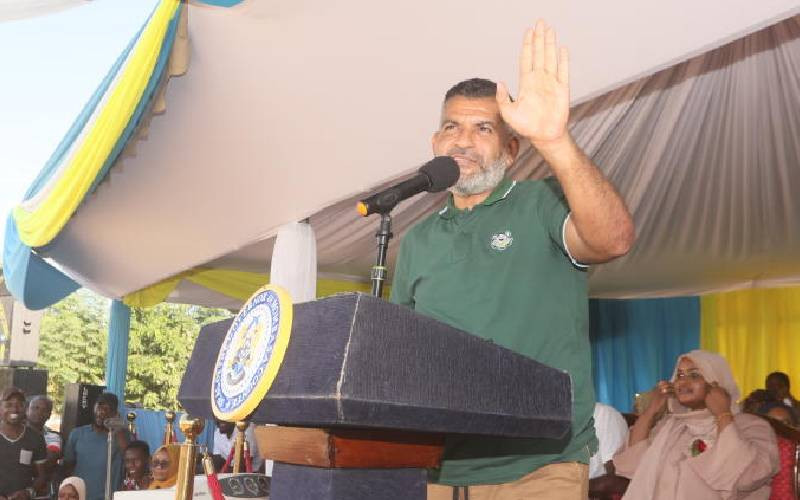By George Orido and Isaiah Lucheli
Nairobi, Kenya: Joy met a High Court ruling Wednesday that a ban on Shackles of Doom by Butere Girls be quashed and that the girls present the play at the ongoing Kenya Schools and Colleges Drama Festival in Mombasa.
Principal Dorah Okalla could not express her delight enough and said she was very happy for her girls.
“Even if it means flying the young actresses there, I will,” she said as she reached out to parents to have the girls who are home on recess sent to meet at the school today.
On Wednesday, the High Court in Nairobi gave Butere Girls’ green light to stage the controversial play, which depicts unequal distribution of resources and dominance of Government positions by the main ethnic groups.
The Ministry of Education and the Kenya Schools and Colleges National Drama Festivals had banned it on grounds it stirred hate and ethnic tension. It was observed the play was performed at the zonal, district, county, regional, and the provincial Gala levels where it was judged the best by panels that comprised three Ministry of Education adjudicators. High Court Judge David Majanja ordered Education PS to accommodate the play in the drama festivals, which enters its third day today. Majanja also directed the ministry to bear the cost of transporting the students to Mombasa in order to allow them participate in the competition.
The judge directed State counsel Samuel Kubamba, who represented the PS, to file documents in court if the ministry felt that the play should not be staged.
Human rights activist Okiya Omtata moved to the High Court seeking to have the ban on the play lifted.
Omtata, through lawyer Ishmael Nguiring’a under certificate of urgency, had submitted that the banning of the play was unprocedural and was taken unilaterally by the Ministry of Education without reference to the National Drama Committee.
Freedom of expression
Omutata had wanted the court to issue orders directing the Attorney General and the ministry to stop gagging freedom of expression and artistic talent nurtured by academic institutions.
“The National Drama Committee ought to have deliberated the issue, and then sought the intervention of the courts or quasi-judicial bodies established for such purposes or related purposes. The first and second respondents have never watched the play being staged,” he said.
Omtata also submitted that if the ministry wishes to censure plays, it ought to establish a proper censorship board, and the exercise should be done before schools invest time, money and other resources in productions.
The activist wanted the court to order the play staged at the national concert in Mombasa beginning today in its original version.
He submitted that the Ministry of Education had unlawfully disqualified Butere Girls’ High School from participating at the 2013 National Drama Festivals.
Stay informed. Subscribe to our newsletter
He added that in order to safeguard the Constitution and to protect the rights of the students, teachers and other members of Butere Girls’ High School, of the playwright, and of the public keen to watch the play, it was imperative the application be heard and determined as a matter of urgency. Yesterday, The Standard caught up with Festival Executive Secretary Khaemba Sirengo, who had issued the ban three weeks ago, who said the Drama Executive Committee was ready to host the play.
Tentative schedule
Consultations between Khaemba’s office and the school production team has agreed on a tentative schedule of the last item on Sunday at Aga Khan High School Hall, Mombasa.
And the playwright at the centre of the controversy, Cleophas Malalah, described the ruling as a new dawn for Kenyan drama. “It is the end of impunity and no one again will wake up one morning to ban a piece of art without following due process,’ he said. Malalah said he was particularly happy that the ruling was a victory for the school girls who had given their all for the production.
“We have not been rehearsing but we want to take the shortest time to prepare them since we are alive to the enormous pressure now on our shoulders,” he said.
Chairman of the Nairobi Metropolitan Drama Committee Kennedy Buhere said the ruling had offered the young artistes chance to be watched by Kenyans.
“I had only seen snippets of it on Youtube and now I will have the opportunity to see it so that I can have a critical appreciation of it.
Director and producer David Isindu said it was unfortunate that the case had to reach the level it did adding that: “We should have conflict resolution mechanisms so that an issue of this nature does not reach the High Court.” Many in Mombasa received the news. It is believed demand to watch Shackles of Doom will be high at the festival. Plans are underway to sell the tickets going for Sh100 on a first come-first serve basis.
Shackles of Doom depicts a film shot in the land of Kanas. These are people with rich cultural heritage spanning years into pre-history who refer to themselves as the True Kanas. For lack of technological knowhow, they are oblivious of riches beneath their land in form of oil deposits.
But this treasure in top secret only known to a neighbouring community who brings in a top delegation as they offer a beautiful bride – Wamaitha to be married off to Lopush, who is a Kana, in exchange of land where they settle. The deal is done.
Wamaitha’s community comes in not only to settle but also to construct the Mafuta Oil Refinery Company. The Kana, whose livelihood has been defined by nomadism and sporadic fishing, are hopeful the new investment would create jobs for the community.
“This oil company will generate jobs and heal the wound of oppression,” declares Lopush, who has become a darling of both communities.
The manager of the drilling firm holding aloft a shield emblazoned with National Cohesion and Integration emblem proclaims, “People let this shield be a symbol of commitment to facilitate and promote equality of opportunities, good relations and a peaceful co-existence. Let us create a new bond of national cohesion.”
 The Standard Group Plc is a
multi-media organization with investments in media platforms spanning newspaper
print operations, television, radio broadcasting, digital and online services. The
Standard Group is recognized as a leading multi-media house in Kenya with a key
influence in matters of national and international interest.
The Standard Group Plc is a
multi-media organization with investments in media platforms spanning newspaper
print operations, television, radio broadcasting, digital and online services. The
Standard Group is recognized as a leading multi-media house in Kenya with a key
influence in matters of national and international interest.
 The Standard Group Plc is a
multi-media organization with investments in media platforms spanning newspaper
print operations, television, radio broadcasting, digital and online services. The
Standard Group is recognized as a leading multi-media house in Kenya with a key
influence in matters of national and international interest.
The Standard Group Plc is a
multi-media organization with investments in media platforms spanning newspaper
print operations, television, radio broadcasting, digital and online services. The
Standard Group is recognized as a leading multi-media house in Kenya with a key
influence in matters of national and international interest.








